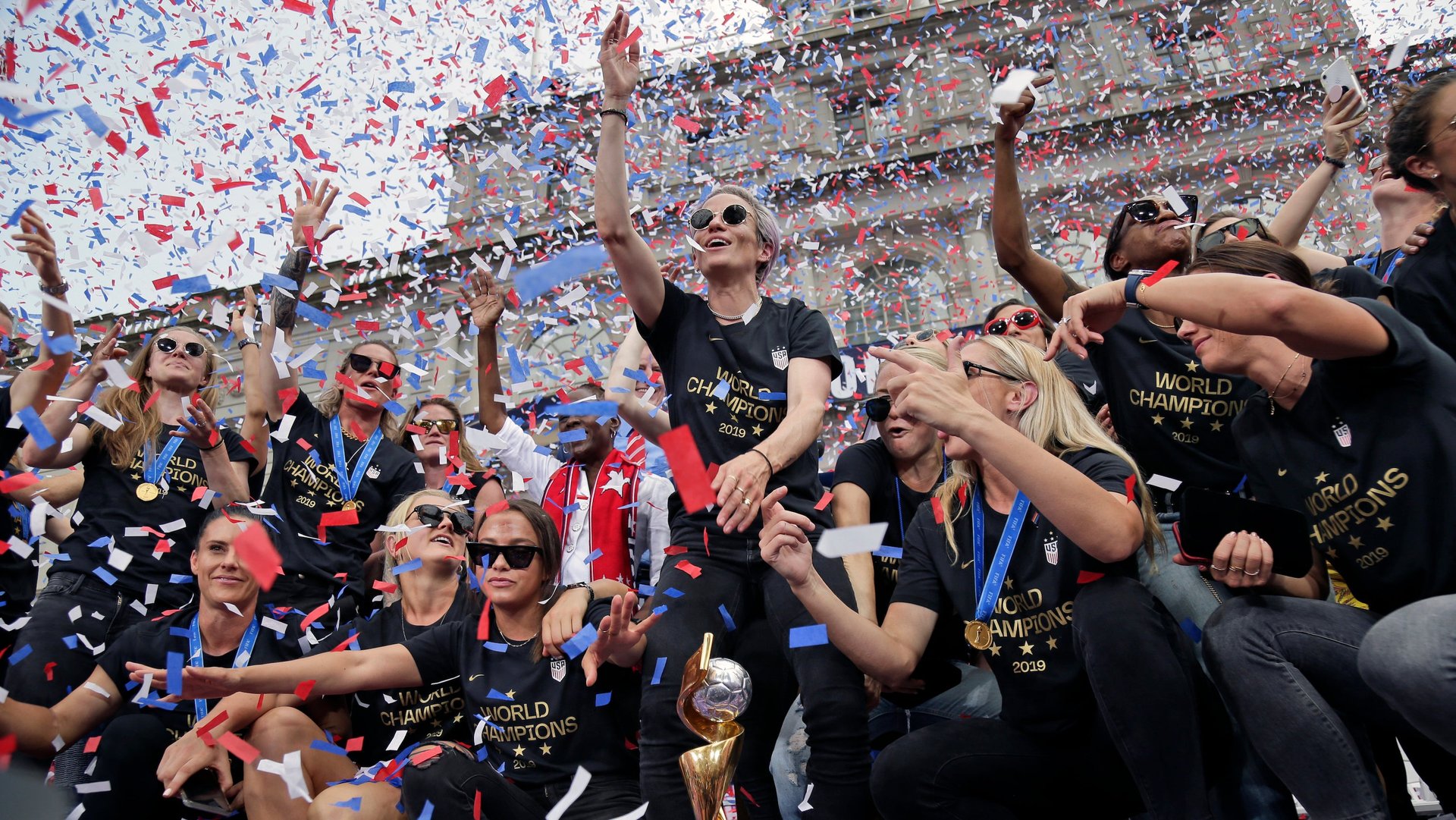The US men’s soccer team steps up as allies in the fight for equal pay
Among the fears that stop some men from supporting equal pay is the idea that if women get paid more fairly, men will somehow lose out. This anxiety stems from a view of the workplace as a zero-sum game, in which genders are pitted against one another in a competition for limited resources. “We grew up thinking this is a level playing field and any policy that tilts it a little bit, we think it is reverse discrimination against us,” Michael Kimmel, a sociology professor specializing in gender studies at Stony Brook University, tells the Guardian.


Among the fears that stop some men from supporting equal pay is the idea that if women get paid more fairly, men will somehow lose out. This anxiety stems from a view of the workplace as a zero-sum game, in which genders are pitted against one another in a competition for limited resources. “We grew up thinking this is a level playing field and any policy that tilts it a little bit, we think it is reverse discrimination against us,” Michael Kimmel, a sociology professor specializing in gender studies at Stony Brook University, tells the Guardian.
The truth is that men as well as women benefit from closing the wage gap—not just because heterosexual couples often live in dual-income households, meaning that the entire family stands to gain from higher wages for women, but because closing the gap would also reduce poverty rates and buoy GDP, leading to healthier economies overall. And so it’s encouraging to see that the US men’s soccer team is setting an example for men everywhere by coming out in support of the World Cup-winning US women’s squad in their gender-discrimination lawsuit against the US Soccer Federation.
The men’s team, which had previously remained silent on both the lawsuit and the US Women’s National Team’s broader battle for equal pay, released a statement yesterday declaring that “the women’s national team players deserve equal pay and are right to pursue a legal remedy from the courts or Congress.”
Much of the statement is devoted to disputing the claims made by US Soccer Federation president Carlos Cordeiro in a letter and fact sheet published July 29 ahead of forthcoming mediation with the women’s team. Cordeiro’s letter argues that women soccer players have actually been paid more than men in recent years, and adds that the Federation has incurred a net loss of $27.5 million on USWNT games over the past 11 years.
A spokesperson for the women’s team told the Wall Street Journal that Cordeiro had inflated the pay numbers by including the women’s professional salaries along with per-game payments. The men’s and women’s teams have different pay structures, with the women getting (relatively modest) base salaries and the men receiving compensation primarily from bonuses and matches. “Any apples to apples comparison shows that the men earn far more than the women,” the USWNT spokesperson told the Journal.
The men’s team appears to concur that the Federation used some shady math to produce its data, calling the alleged loss of $27.5 million “false accounting” because it doesn’t include revenue from sponsorships, television, and marketing. They further add that while the pay structures of the men’s and women’s teams are different, “we do not believe that justifies discrediting the work [the women] do or the real value of their profound impact on the American sports landscape.”
Perhaps the most noteworthy part of the men’s statement is the fact that they felt compelled to step forward at all. In so doing, they may have helped to combat a number of misconceptions about equal pay.
For one thing, the men’s team struck a blow against the idea that paying women more necessarily means paying men less. Their statement accuses the Federation of focusing “on increasing revenue and profits without any idea how to use that money to grow the sport. One way to increase profit unfairly is to refuse to pay national team players a fair share of the revenue they generate.” In other words, the men aren’t worried that paying women’s soccer players more money will have a negative impact on their own incomes; the wage gap benefits the Federation, not the male players.
Equally important is the fact that the men’s soccer team acknowledged that a wage gap exists at all. According to an online poll of 8,566 US adults, conducted by SurveyMonkey in March 2019, 46% of men agree that the larger societal wage gap “is made up to serve a political purpose” and is not a “legitimate issue.” Every high-profile man who speaks out about the issue puts a dent in this perception.